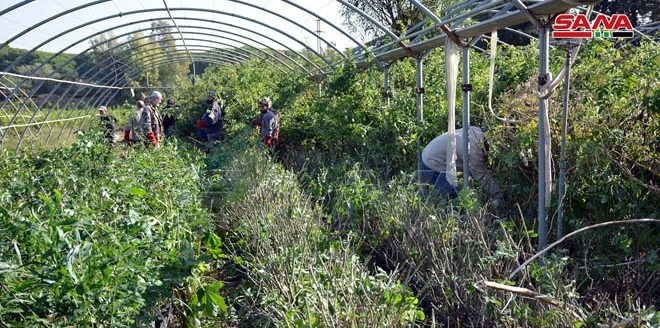Within the framework of carrying out projects in the fire-affected areas in Lattakia province , the Syrian Trust for Development, in coordination with the Ministry of Agriculture and Agrarian Reform, the Peasants’ Union and the Arab Center for the Studies of Arid Zones and Dry Lands “ACSAD”, is working on a project to plant the Damascene rose in the mountainous areas of Lattakia countryside.
The first stage of this project started from the village of “Qala’atAl-Mahalba” Castle in the countryside of Qardaha, where about 12,000 seedlings were distributed free of charge to farmers in the village in support of the families affected by the fires during the past year.
Expert Dr. Ali Sa’adat at ACSAD said to SANA that the cooperation between the Ministry of Agriculture, the Syrian Trust for Development and the Farmers’ Union aims to spread quality crops, including the Damascene Rose.
He pointed out that Lattakia was chosen due to the damage caused to farmers by fires, especially in the high mountainous areas, where the conditions are suitable for planting rose bushes, which result in a high economic return.
The expert noted that the economic return of the Damascene rose is in the production of rose oil and rose water, which can be exported to a number of Arab and foreign countries at good prices, in addition to their use in many local industries, especially food, such as sweets, jams and other products.
He referred to the possibility of using rose water to purify domestic water tanks as is the case with the people of the village of Al-Marah in the countryside of Damascus, where the cultivation of this rose is widespread.
The Director of the Botanical Administration at ACSAD Dr. Walid Al-Taweel pointed out that the Damascene rose provides remunerative economic benefits to farmers and is suitable for small agricultural holdings, indicating that ACSAD provides the necessary technical expertise, trains farmers in the field of agriculture to reach the stage of productivity and spares no effort to put all its capabilities at the disposal of this project.
Al-Taweel indicated that the project includes several stages , the first of which is the planting of about 12,000 seedlings in the village of “Qala’at al-Mahalba”, which was previously exposed to large fires.
He said a team of experts and technicians visited the mentioned village and trained farmers how to deal with the seedlings of Damascene rose and get the economic benefit.
Al-Taweel referred to the existing cooperation with the Ministry of Agriculture, the Syrian Trust for Development and the Peasants’ Union in the fields of providing families with crops of economic returns such as the village of Talat in the countryside of Tartous for the production of saffron.
He indicated to the cooperation in the fields of spreading honey apiaries, especially in the coastal region, which are ideal areas for the production of fine honey .
Director of Agriculture in Lattakia Basem Douba stressed the importance of the project in supporting and cultivating the Damascene Rose and spreading in the appropriate areas in Lattakia as a way of replanting the fire-affected areas with pioneering crops of economic returns.
Douba pointed out that the directorate, through its nurseries for the production of the Damascene rose seedling, is able to double the production of the plant by dozens of times according to the development of the experience and the quantities needed for the project.
He stressed that the directorate is ready to provide experiences and training to the local community in the fields of raising efficiency and enabling the farmer to sell the product and achieve the primary benefit of this cultivation.
RawaaGhanam

